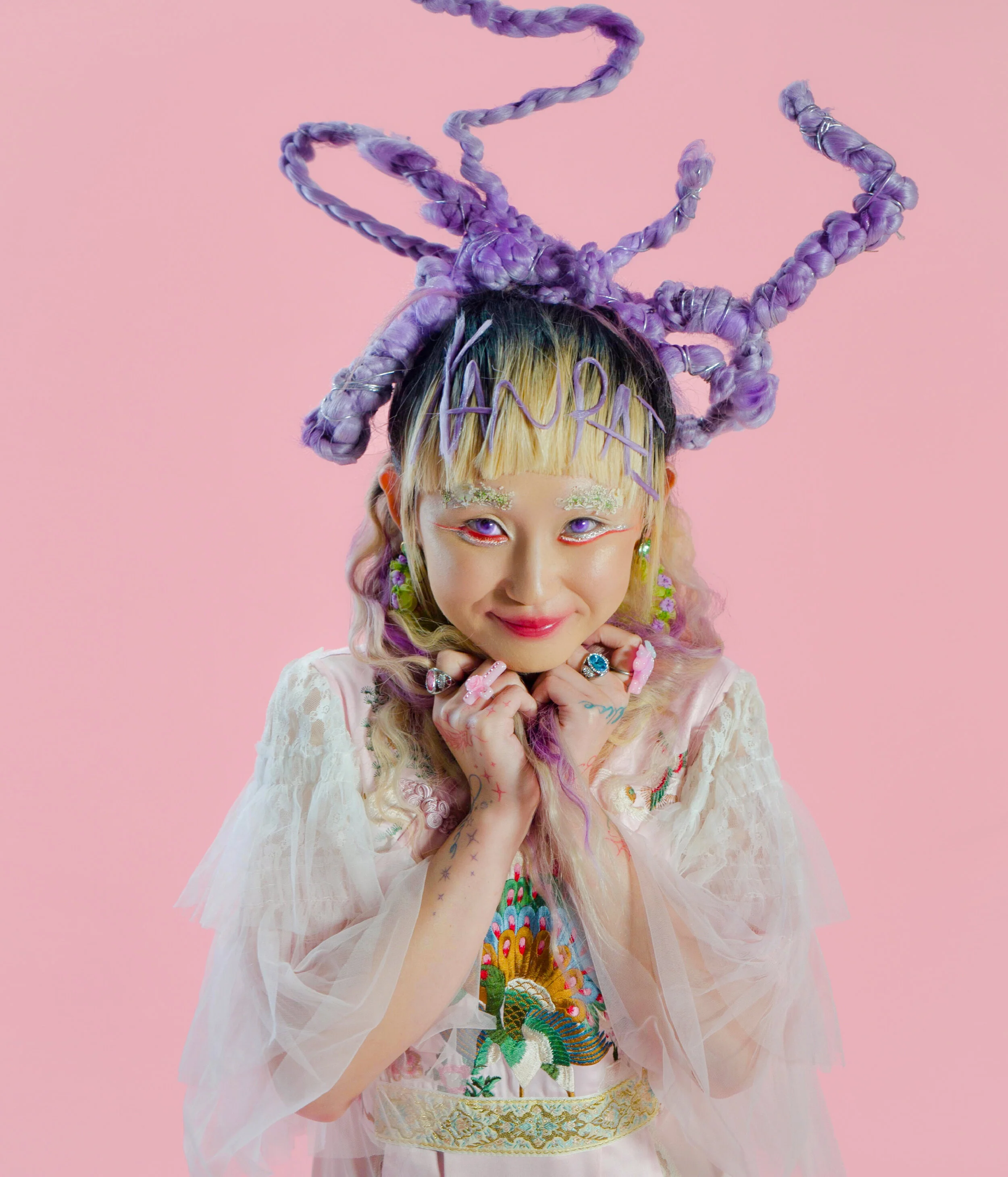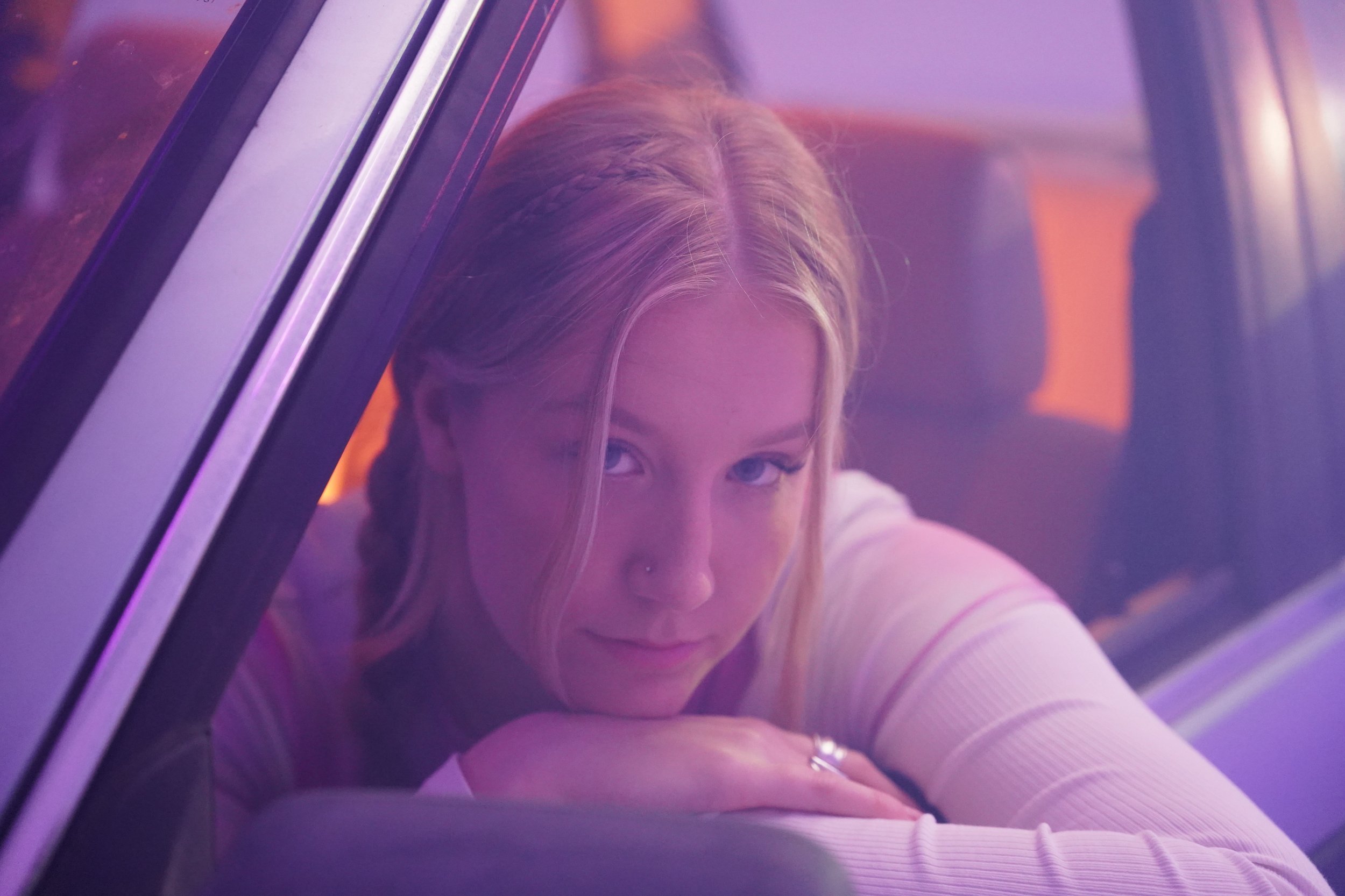INTERVIEW: Introducing AViVA and her new single 'Melancholy': "It's that desperation for your own uniqueness that makes you always feel like an outsider."
Interview: Jett Tattersall
Image: MataisC
Australian musician and author AViVA is becoming one of the most talked about artists in music right now, and it is easy to see why. With her addictive, electro-emo pop, her growing army of supporters (who call themselves the ‘outsiders’) and her determination to speak out and use her platform to address issues such a mental health and bullying as well as encouraging teenagers to be themselves, she is an artist that is inspiring to be around.
Her new single ‘Melancholy’ was released on Friday and it is a dark electro track with a sing-song melody and minimalist beats which addresses the downward pull of depression: “Hear me scream and shout / Caught in this roundabout / Tangled thoughts wrapped up in cotton thread / Didn’t want to leave my bed” she sings. The video for ‘Melancholy’ is also out now, co-directed by AViVA and long-time collaborator Jeffeton James, and places AViVA in a series of isolated situations: lying in a hospital bed, trapped behind a school desk, singing to her own reflection inside the room of an abandoned and decaying home.
First coming to attention in 2017 with the release of her debut single ‘GRRRLS’, she has since built up a huge presence with over 3 billion global streams of her music to date. She takes her artistry down another path later this year when she releases her debut novel SELF/LESS on September 28. The book is set in a dystopian society in which all forms of self-expression and creativity are outlawed and follows 17-year-old Teddy as she rebels against her upbringing and discovers a secret world beneath the walled-in city where she was raised.
AViVA will finish off the year with a headline tour across Australia in November. An artist who is becoming impossible to ignore, you can expect even bigger things from AViVA in the years to come and we recently caught up with her to find out more.
AViVA you are such a peach and I'm digging everything that you're putting out. First of all, how are things in your technicolour universe?
Very good despite the current lockdown situation. I suppose when you're a creative type, it's not such a bad thing, I like being at home anyway because I'm always doing things. It's forced me to do a bit more editing because I'm currently editing my second book in the SELF/LESS series, it's forced me to do a little bit more than I probably thought I was going to do every day. But that's a good thing. I'm very blessed to have a beautiful property with lots of space so I can do lots of gardening.
I want to talk to you first about 'Melancholy'. There are pop top notes in there with your signature kind of grunt, but I love the sugar coat on it. Can you talk me through not just where this song came from, but your desires for it because there's a definite shift there - and shifts are always good.
The reason it's different, and the reason I wanted it to have its own vein, is because I don't really do many songs that are more subdued. Most of my choice of messaging is very empowering from the get go, even if some of the lyrics are dark. It's all about taking back ownership and self empowerment and finding that voice. But in 'Melancholy', it's harder to find that thread on the initial listen. But the meaning behind this song really is about finding that change, that line, 'things will never be the same', and going, ‘that's not such a bad thing, I've weathered this storm, and I'm stronger for it.' The message is slightly different to how I'd normally deliver it where I'm like, ‘burn burn in the fire!’ and in 'Melancholy' I'm like, ‘oh, you've got me melancholy.’ It's probably a little more similar to 'Cursed' in that sense.
You were influenced by some killer artists in your family growing up. What was the push that led you into music?
I've always been a creative person, and I've always grown up in creative homes. My dad's a musician and a visual artist, my mum loves music. When I was very young, we grew up in my grandparent’s home and my uncle's both sang and played guitar, and my grandparents loved music, and all my grandparents encouraged me to do lessons, I started playing piano when I was three, I started violin when I was four. I have literally been doing music for as long as I can remember. And as long as I could be writing, I've been writing stories and, and I have pretty much every notebook that I've ever written in, since I was probably about seven or eight. And they're filled with stories, as well as my little crushes and my most heartfelt desires! I can't pinpoint a time in my life where I haven't had reading and writing and listening to music and being a musician. As far back as my memory can take me [it’s] the core part of my existence.
Your songs have this beautiful way of coming from a place that seems very personal but at the same time distant. And I guess that comes from being a novelist as well, it's projecting, maybe even your own process and your own emotional process into a character. Have you used your characters in the past to process what you're going through?
For me, the music, the songs that exist are inextricably connected with the world of my book. They soundtrack it, like if you were reading the book, the music that I have put out is the music you would be hearing. But I don't ever say where those songs apply. Because your interpretation, like you said, it's all subjective, you might think that 'Melancholy' goes to this moment, it has to be that moment. And I'm not going to say which moment it is because that ruins the magic. I want listeners and my Outsiders and anyone who consumes my art to be able to apply things where they feel it fits best for them. It's a fine line between telling people and allowing people to interpret things themselves. That's important to me, as an artist, I don't want to be dictating every single thing like, this is where this song goes, and this is the moment in the story, and this is the character who's feeling this way. I don't want people to feel like that, because then it loses some of the magic of being able to create that world. I want people to listen and go, ‘this really empowers me against my boss, or my mum, or my sister, or my brother, or that person that always walks past me on the footpath what I do my morning run and scowls at me’, whoever it is in their life they need to feel like they have some sort of strength and power in themselves. I don't want to be like, ‘well, this is a song about a very specific person in my life that did this specific thing to me, and it made me feel like this’. Like it's pretty clear how I feel in the songs. It shines through.
How important is it for you with the platform that you have to be not just a voice but to be that beacon of inspiration that you inadvertently have become?
That is the most important thing to me, it is the crux of why I do this because I am very passionate about mental health and young people in particular teenagers. I was a high school teacher and I feel very strongly about that experience because I found it really difficult when I was a high school teenager, I found it really, really hard. Because I am very different, and I'm very creative, and I'm very eccentric, and all those words were were negative words. People would be like, 'AViVA is so unique, she’s a bit weird', it wasn't 'AViVA's so unique! Isn't that amazing? All those sorts of little things that teenagers do that later have massive impact. I could still see these things when I was working in school. There's a lot of amazing women role models, but they're much older women. And it's harder for younger girls to look up to them in the same way. I always felt it was really important to be a strong role model, and to be clearly defined in my self identity. I want to provide a platform where I can communicate that to people of all ages that even the most popular, cool looking people in the world, still have something about them that makes them feel like they don't fit in. It's the dichotomy of being a human - you crave fitting in, but then you also crave to be unique. And it's that desperation for your own uniqueness that makes you always feel a little bit like an outsider. And I want to be somebody that people can turn to and go, ‘she's okay with it, and if she's okay with it, then maybe I can be okay with it’. Maybe watching anime isn't such a wild, outlandish thing. Maybe the fact that I just like to talk to my video game friends and not real life people, whatever it is that people think makes them such a weirdo. That's why I call myself the queen of the freaks, because being called a freak is something that people are still trying to make a negative thing. And honestly, why wouldn't you want to be a freak - it makes you so much more interesting!
You have relocated to LA, you shift between LA and Sydney. Australia’s music scene is predominantly based on white man rock - it's just what we do here. Has that shift to LA affected your sound or opened you up and elevated you as an artist, because there just doesn't seem to be room for the ladies who sing here?
I actually chose to go to LA because my sound was decidedly not Australiana, as I call it. There are women and men in Australia who create this music that is very niche and very Australian, and not very inclusive. I have very strong feelings about this because I'm all about inclusivity across the board, and when there are musical people in the musical world that aren't inclusive, I find that painful. The sound didn't change for having moved to LA, because the sound is my essence - I moved therefore the sound moved with me. I love LA so much for music, the opportunities, the live scene and my team who are all there. But from a songwriting perspective, I don't think that there's any special magic in the water that people necessarily think there is. I have done a lot of writing sessions and the white man music you talk about, and the attitude, is very much thriving in LA. Being a woman in music is something that I didn't think was actually something until I thought about it, and then started to look at it with a different lens. There's a lot of expectations on female artists and songwriters that aren't on male artists. If you don't look at it, you don't see it. And that's why these things exist everywhere - if you're not looking, you don't see.
Lastly, before I have to leave you AViVA, what is coming up for you in the rest of this magical year?
This magical year has a lot of great things. Obviously, 'Melancholy' is out and then closely followed by the release of my debut novel SELF/LESS which ties in music, and it's all about creativity and self expression and self empowerment, which I'm all about. There is some touring, COVID allowing, we just need to sort of see where those ones go but definitely more music and more world building and more strong women to the front.
‘Melancholy’ is out now via Island Records. You can buy and stream here.
To keep up with all things AViVA you can follow her on Instagram, Facebook and Twitter.
AViVA will be performing across Australia in November. Tickets on sale now.
November 12 – Enigma Bar – Adelaide (All Ages)
November 13 – Wrangler Studios – Melbourne (All Ages)
November 20 – Factory Floor – Sydney (Afternoon All Ages)
November 20 – Factory Floor – Sydney (Evening 18+)
November 21 – The Brightside – Sydney (Afternoon All Ages)
July 6 - 9 (2022) - Mad Cool Festival – Madrid, Spain







